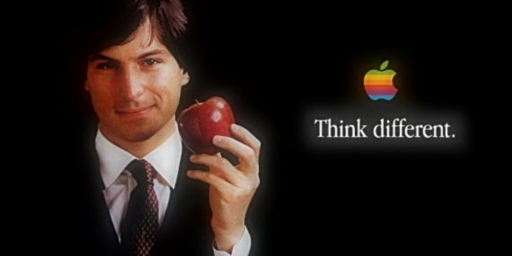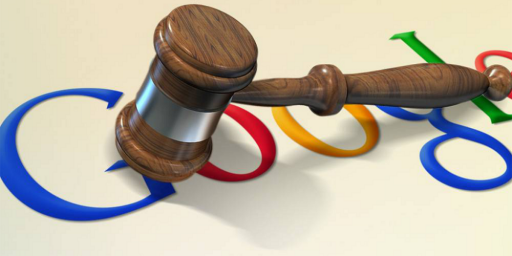Don’t Be Afraid Of Technology
There's far more good in technology than bad, but these days we seem to be far more focused on the bad right now.

There has been much commentary in recent years about the dangers associated with our increasing reliance on, and use of technology such as smartphones, tablets, and other devices that, among other things, have made life both easier and more complicated. There has also been an increased focus on issues such as data privacy and the alleged monopolistic behavior of companies like Facebook and Google. Amid all of this, we have a generation of children who are growing up with technology at their disposal that most of us didn’t come to see into being until well into our adulthood, which has led some alleged thinkers to wonder what kind of adults these tech-savvy children will become.
These second thoughts about the impact of technology and the speed with which changes are coming at us are well taken but, as Kenan Malik notes at The Guardian, we ought to be careful about throwing the technological baby out with the bathwater:
Today, techno-utopia has given way to techno-dystopia. Many worry that technology is undermining democracy, spreading misinformation, equipping criminals and the authorities with new tools. This month, Apple, under pressure from the Chinese government, pulled an app that let protesters track the movements of Hong Kong police with crowdsourced data. It has been a long road from Tunis to Hong Kong. There is an element of truth about techno-utopia and dystopia. Social media makes it easier for protesters to communicate, create forums for discussion and spread information. Technology also makes it easier for authorities to snoop on citizens and control dissent.
Both viewpoints treat technology as if it had a life of its own, as if it possessed agency. This makes it more difficult to answer the vital question: not “Is technology good or bad?”; but “How should we organise ourselves as citizens to make the best use of technology?”
Techno-dystopia has created a climate in which there are increasing demands on social media companies to police the internet more diligently, and greater fear of cybercrime than of state surveillance. The irony is that the fear that technology can be used against our interests is leading to us, as users, having less control of the technology we use and to be more estranged from it.
To be sure there are aspects of the increasingly prevalent presence of technology in our lives to be concerned about, and the speed with which it is happening is sometimes hard to keep up with. Many of the recent innovations, for example, involve creating the “wired” home through things such as video doorbells, appliances connected to the Internet and available to be accessed via mobile apps. Most recently, I’ve been seeing an ad from Delta for a faucet that can be controlled via Alexa, Google Home, or any of the other “home” devices that have come on the market in recent years.
Some of this is questionable in its utility, of course. I can see the advantages of having an HVAC thermostat that can be accessed via a mobile app, or even a crockpot with the same feature. Additionally, devices such as Alexa allow people to do any number of things via voice, which is obviously an easier and more efficient way of communicating. Additionally, technology like this makes like much easier for disabled people and the elderly.
Notwithstanding these advantages, we seem to be in an era where there’s a lot of second-guessing about technology going around, much of it seemingly contradictory. People complain about alleged losses of privacy but nonetheless surf the web and use social media on a daily basis in ways that leave little tidbits of their lives lying around on publicly accessible computers. They carry around smartphones and use apps like Google Maps, Uber, and Lyft that are constantly monitoring their location. The same goes for weather apps and other services that the vast majority of us use as if it were second nature.
As I said above, there are downsides to technology and we should be careful about the extent to which it is rapidly changing the world around us. At the same, though, Malik is right that we would do better to not let ourselves get tied down by fears of a techno-dystopia. To be sure, there are reasons to be nervous about how this technology can be used, with some of the best examples of that coming from authoritarian states like China, something that is happening at the same time that Washington and the traditional media are demanding that new media companies like Facebook censor their users for saying unacceptable things. Allowing that to slip out of fingers in the name of “regulation.” government-mandated control of content, or corporations deciding what is and isn’t acceptable speech would be an incredibly bad idea. .
For the most part, the technology revolution, and even things like social media have had a far more positive impact than a negative one. It has allowed people to communicate with each other far more easily. It has helped people seeking to resist authoritarian regimes a way to communicate, and it has made life easier in ways we could not have anticipated before it came into existence. Rather than being afraid of it, we ought to be embracing it.






That last sentence is out of place and belongs to a different essay.
I didn’t think so but nonetheless I’ve revised the post.
I’m sure someone back in the medieval period was complaining bitterly about the horse collar and how it would totally ruin farming.
I’m not into “smart appliances” but that’s because I prefer things that don’t require batteries. Do appreciate my smartphone–mainly for texting, taking snapshots (do this whenever you rent a car so you can find it again when you’ve parked it), and orienting myself here in the city after coming up out of the subway.
I don’t fear for my privacy because I’m prepared for anything I’ve done to be broadcast. It’s really amazing how powerful honesty is. It’s hypocrisy that gives leverage to people who know your secrets. Don’t be a hypocrite and what do you have to worry about? Want to see my emails? My browser history? My bank statement? My tax returns? OK.
I don’t fear data collection because I think it’s mostly fool’s gold. Let ‘them’ have every single bit of data about me. So what? So I can’t do what, exactly? It doesn’t upset me that some advertising is clearly targeted at me. It upsets me more having to watch pharma ads, or starving children ads on TV.
Attempts to predict human behavior will fail. Consciousness is closer to the eerie world of quanta rather than the mechanical macro world. It’s sort of a probability wave in which the awareness of observation becomes a factor in itself. Give me a choice between A and B and I may choose either. Give me a choice between A and B and predict the answer will be B and you’ll have made A far more likely. You really want me to choose B? Don’t play games, offer me an incentive. But if I suspect you’ve gamed out the incentive, I’ll reject it.
Oppositional Defiant Disorder certainly helps, but even normal people are annoyed by being worked.
Our consciousnesses are built out of DNA, our life experiences, free will and random chance. Data collection doesn’t touch random chance. And so long as we have the free will to choose either A or B, or step outside the box and choose A and B, or neither, data analysis doesn’t worry me.
That said, and despite being an early adopter of most toys, I can’t see any use for Alexa or the Apple Watch for that matter. I use Siri for only two things: Siri, set timer for four minutes, and Siri call my wife. Beyond that she’s not just useless, she’s an annoyance.
In 1984 everybody was required by the gummint to have an audiovisual spy in their homes. 70 years later people are paying for that device.
(yes i know it’s not exactly the same)
I’m less optimistic. Without technology — specifically social networks connecting people who would normally be the angry cranks who show up at town council meetings — we would not have significant antivaxxers or climate change deniers.
Also, we are making it easier and easier to cause greater harm. Either intentionally, or by accident. if you make it easy to get ahold of a semiautomatic rifle with a large magazine, you have to expect that some will get into the hands of people who just want to kill a lot of other people — mass shootings will go up. How many countries now have nuclear technology? How are their command and control processes?
I remain convinced that someday a grad student at one of our universities will kill us all by trying to create bacteria with a new DNA pair or something (why be constrained by CATG?) and then fail to contain it.
Also, cryptocurrency uses an amazing amount of electricity (As much as solar generates at present), which creates greenhouse gasses. All to enrich douchebags and make it possible to buy child porn.
Making human flaws (stupid carelessness, obliviousness to consequences, self-destructive tendencies) more efficient is not going to end well.
But, yes, being able to tell your thermostat to turn up the heat is nice. Even if the government is monitoring your thermostat.
…there are downsides to technology and we should be careful about the extent to which it is rapidly changing the world around us.
I’m finding myself wondering who’s saying to be afraid of technology. I’m not hearing that except as a warning that I shouldn’t. And I don’t. I’m not particularly afraid of any of the advances or even bewildered by them; they simply have no utility for me.
On the other side of the equation, people will always find ways to abuse whatever is available. I hold that’s true because people tend to seek opportunities to abuse others. (Did I mention that my philosophical outlook leans Calvinist?)
20 miles south of me in Alachua there’s a company doing that. I’ve been in those labs. In the 80’s scientists made a new one. Different teams have made different ones with different properties. They’re fragile little things. Not going to turn into Martian Ebola and kill us all. 😛
Now, recreating Smallpox from the sequence is legit dangerous. If I were the Deep State I’d have some Mercury Rising kill team going around and liquidating anybody trying that shit.
@Teve: Many low-risk/high-consequence projects times many grad-students equals moderate-risk/high-consequence.
I’m not sure what the project will be that wipes us out, but I’m pretty sure about it being a grad student. High stress, the youthful belief that they know better and can cut corners, and the tight money that causes them to not destroy contaminated clothing, just wash it twice.
@Michael Reynolds:
You also have the advantage of not depending on other people’s opinions of you to survive. If you become unemployable tomorrow, you’ll get on fine quite nicely with your current savings. Most of us need to conform, or at least maintain the appearance of conforming, to a rather narrow band of societal expectations lest we end up starving and homeless.
I’m not afraid of technology, there is just so many aspects of it I dislike very strongly and so, opt out. At my age, and condition, I can do that and suffer not at all. So, is it worth my while to learn it and partake? No. Besides, I know I’ll be dead within the next decade or so and will have missed absolutely nothing important to my waning life at all.
@Gustopher:
Social media is very adept at disseminating propaganda. It does less well at disseminating useful information.
@OzarkHillbilly:
So long as you have a reliable source of cat memes, pictures and video, you won’t have missed anything.
Behold Cinderblock.
The age of social media, it turns out, has made it, on balance, harder for me to connect, and to form communities. Or rather to stick with them.
That’s because at least three times now, I’ve linked up to a community, had a really good time with them, bonded, and then had the rug pulled out from under me as the community shut down because some third party had control of the situation. This has been hard on me emotionally. Obviously, none of these platforms are Facebook.
Seriously, I had some serious, strong friendships that did not endure outside the platform, because the identities shared were based on the platform, and the reason for our discussions evaporated, leaving me lonely and isolated.
I apologize if this is oversharing, but I think this a commonplace thing these days. We give third parties control over the ways we communicate and form communities. That’s why I’m sticking to blogs (that aren’t on blogspot or some such!). No third party can shut them down.
But blogs aren’t foolproof either. I had one blog community that got shut down because there were too many sea lions. It got too famous, and that attracted people who just wanted to scribble graffiti (or smear feces) on the wall. In the end, the trolls won, and I lost more friendships.
@Gustopher: Cinderblock cracked me up. Gotta love that cat.
@Gustopher: Cinderblock!!!
The issue isn’t so much with technology as with the people who are creating it and their underlying philosophies and biases.
The fact that the tech industry as a whole has embraced a philosophy of “move fast and break things” (as part of a general tech bro culture) gets scary as it increasingly permeates areas like medical research and law enforcement.
Likewise, its not so much algorithms that are scary as it is what people will trust them to do (and assume that there are no biases within them). The issue is that typically those biases effect the most vulnerable populations and therefore are often “invisible” to the general public.
But perhaps the biggest problem is that the speed of tech development is always going to outstrip the capability for intelligently regulating it. Especially when the people who are most likely to make those regulations are often then ones who are the least likely to actually use the technology or understand the potential ramifications of their actions.
@mattbernius:
That’s a good point. some people are too trusting of computers, not understanding the computer program is only as good as it was crafted. Errors in an algorithm, of any kind, remain errors, no matter how efficiently they are incorporated in the output data.
Ancient memories stir within my aged brain, Doug. I seem to recall ..
Used to be weird machines called “airplanes”, which did … I forget. Flying things which weren’t insects, some of them going around the earth! All over the place. There were magazines devoted to them; I used to subscribe to one called “Aviation Week and Space ” …er … something. “Aviation Week and Space Thinginess” I guess. Maybe someone cleverer than me could look it up.
There’s some stuff connected to medicine. Heart valves, transfusion, blood types, that sort of thing. I guess it’s Biomedical Thinginess.
And there’s Chemical Thinginess — useful for making gasoline and other weird things that people relied on in ancient days.
Also in the C’s, there was a substance called “concrete” It was used in roads and buildings and other things. There was an occupation — lots of occupations actually — involved with making stuff with it. I think it was called Construction.
Sort of connected to Biomedical Thinginess is Drugs. Marijuana and Cocaine and Heroin of course, but also stuff people took for health purposes. Sometimes real old people reminisce about Pharmacology, it was that kind of thing. There were even people called Doctors who got paid to know about that stuff. Paid real well for some reason that escapes me.
Even before semiconductors, people did stuff with electricity. They electrocuted other people, for instance. And powered childrens’ toys and made lights go in dark places, even at night! Weird, eh? That was all Electrical thinginess.
Also farm machinery. Remember farms? Do people still have them?
And glass! Y’know, you can make stuff out of silicates that doesn’t process data or hold it in memory. You can put whiskey in it or cover over openings in your walls with glass, and it can even be transparent! So strange.
There’s highways. Remember highways? People laid out strips of concrete and other stuff and ran cars over it. Remember cars? They used to be really big. People obsessed over cars, but we’re past that now.
I might go on — there’s Plastics! and Military Stuff! and Stuff That Goes Over Oceans And Even Under Them! — but maybe I’ve sort of said what I wanted to say. It’d be a wonderful thing if we had some collective name for these obsolete fields of knowledge. I seem to think we did, but it hurts my head too much when I try to think of it — maybe there’s some Drug Thinginess that would help me.
Is there something that would work on you?
@mike shupp: I still obsess over cars; ‘ 63 Chevy Impala SS, 4 speed Muncie trans, 2 – 4 barrel, 327 cu. in. 300 hp. mill, Holley carb, and glas packs.
’69 Mercury Cyclone: Ford Boss 429 cu. in. mill, 600 hp.
Chevy has a new Camaro with an 800 hp. engine option.
“She’s real fine, my 409” Beach Boys